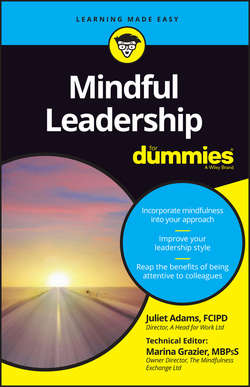Читать книгу Mindful Leadership For Dummies - Adams Juliet - Страница 6
На сайте Литреса книга снята с продажи.
Part 1
Breaking the Mould
Chapter 2
Discovering Why Mindfulness Matters to Leaders
Leadership Challenges of the Modern Workplace
ОглавлениеTo discover why mindfulness matters, you need to consider the leadership environment you’re currently operating within. Are you working in a VUCA world? Is change now the norm, rather than the exception? Its also wise to consider the sources of workplace pressure that can lead to stress. Doing so can help you develop mindful ways to increase resilience and maintain well-being.
Leading in a VUCA world
The concept of a ‘VUCA world’ first originated in the U.S. military. In recent years, it’s become a popular management acronym, used to describe the difficult business environment many people lead within. It stands for volatile, uncertain, complex and ambiguous. Some use the VUCA world as a scapegoat to delegate all responsibility for leading their organisation out of crisis.
Mindful leaders are self-aware and take personal responsibility. They know that although they can’t necessarily control the VUCA nature of the modern workplace, they can take full responsibility for their actions and control their response to it.
The following sections explore the meaning behind the VUCA acronym in more detail.
Volatility
Volatile work challenges are unexpected, with an uncertain duration. The good news is the information is usually out there – you just need to find it. An example of a volatile work challenge may be share prices falling rapidly following a natural disaster.
Uncertainty
Uncertainty at work may result from you knowing that something bad is coming but not knowing exactly what form it will take, how bad it will be or how long it will last. An example of this is the UK Government’s attempts to reduce the deficit. The public sector knew that cost-cutting measures would result in major budget cuts, but they didn’t know exactly which services would be impacted and by how much their budgets would be reduced.
Complexity
Complexity can be caused by situations with interconnected parts or interdependencies and variables. Information is available, but the volume or nature of the information may be overwhelming or difficult to process. Global working is a good example of complexity: trying to deliver a good service to a business in many countries all with different cultures, currencies that fluctuate, and wildly differing legislation.
Ambiguity
Ambiguity involves those ‘unknown unknowns’ that are difficult to predict and have no precedents. An example of this may be moving into a newly emerging market with a new product range unlike anything you’ve manufactured in the past.
Leading when change is the norm
In the past, many leadership models were largely based on the principle that although organisations would experience times of change and transition, eventually they would settle into a stable ‘business as usual’ state. For most modern organisations, change is now the norm.
Of course, change is nothing new. In reality, change is the only constant in life. The difference is the pace of change. The pace of change has accelerated dramatically in recent times, fuelled, at least in part, by the digital age, shifting away from industrialisation towards an economy based on information shared digitally via computers. Access to and the control of information are key elements of business success. Indeed, for many companies, such as Google, the ownership and control of information is their business.
Humans hate uncertainty and are predisposed to feel uncomfortable in new situations. Mindful leaders recognise their inbuilt fear and resistance to change and how it manifests within them. They recognise their own patterns of avoidance and fear when confronted by unexpected change and have mastered techniques to stop them from sliding into negativity, fear and procrastination. You find more about the human negativity bias in Chapter 3.
